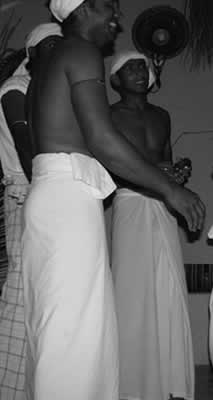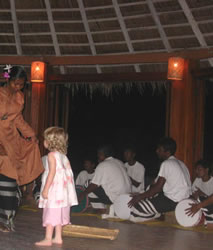Call now to book your Holiday: 00960 333 0595
Delivering Dream Holidays...

Ethnicity
The origins of the Maldivian people are shrouded in mystery. The First settlers may well have been from Sri Lanka and Southern India. Some say Aryans, who sailed in their reed boats from Lothal in the Indus Valley about 4,000 years ago, probably followed them. Archeological evidence suggests the existence Hinduism and Buddhism before the country embraced Islam in 1153 A.D.Not surprisingly, the faces of today’s Maldivian display the features of various faces that inhabit the lands around the Indian Ocean shipping and maritime routes, the Maldives has long been a melting pot for African, Arab and South East Asian mariners.
Language
The language of the Maldivians is Dhivehi, a language which is placed in the Indro-Indian group of languages. Dhivehi with its roots in Sanskrit and according to some researchers Elu, an ancient form of Sinhala, (spoken in Sri Lanka), is strongly influenced by the major lanuguages of the region. The language has been influenced heavily from Arabic since the advent of the Islam in 1153 and English in more recent times, especially since the introduction of English as a medium of education in the early 1960s.
Given the wide dispersion of islands it is not surprising that the vocabulary and pronunciation vary from atoll to atoll, with the difference being more significant in the dialects spoken in the southernmost atolls.
The Maldivian script known as thaana was invented during the 16th century soon after the country was liberated from Portuguese rule. Unlike former scripts thaana is written from right to left. This was devised to accommodate Arabic words that are frequently used in Dhivehi. There are 24 letters in the thaana alphabet.
Family Life
The close-knit island communities practice mutual aid to survive difficult circumstances. A system of extended families provide a safety net for members of a family going through a difficult period. In addition to the parents other members of the family also contribute in the care of children. Traditionally men go out fishing during the day and women are responsible to look after the affairs of the family and vary often the community. This remains so even today in smaller island communities.
Religion
Since Maldives embraced Islam in 1153, Islam has been central to the life of Maldivians. The main events and festivalss of Maldivian life follow the Muslim Calendar. From infancy children are taught the Arabic alphabet. Religious education is provided both at home and at school. Islam is part of the school curriculum and is taught concurrently with other subjects.
Food
Maldives being at an important crossroad in the Indian Ocean, traders and visitors over time have left their mark on Maldivian cuisine in addition to contributing towards the moulding of the country’s culture and norms.
As the Maldives comprises more sea than land, it is only natural that fish (mainly tuna) have always been the most prominent element of Maldivian food. However, with travelers from different parts of the world, new seasonings and vegetables were introduced in to the country and added to the existing (limited) repertoire of seafood and tubers (e.g. taro & sweet potato). Each new discovery was incorporated into the diet in quantities most palatable to Maldivians. Thus Maldivian cuisine now comprises Arabic, Indian, Sri Lanka and Oriental tastes blended into a unique cuisine that embodies a culinary identity of its own.
Go to Top












